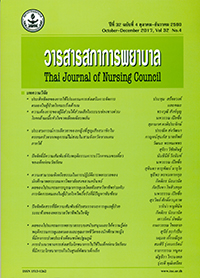Selective Factors Related to Intensive Care Units’ Registered Nurses’ Competency in Caring for Terminally Ill Patients
Keywords:
competency, intensive care units registered nurses, terminal illAbstract
Abstract
Objective: To identify selective factors and their relationship with intensive care
units’ registered nurses’ competency in caring for terminally ill patients.
Design: Descriptive correlational research.
Methodology: Through stratifed random sampling and population ratio sampling,
250 participants were selected for this study. They were registered nurses serving in ICU
wards of hospitals and medical centres in southern Thailand. Data were collected using
4 questionnaires: (1) a general information questionnaire; (2) a questionnaire on registered
nurses’ perception of their competency in caring for terminally ill patients; (3) a questionnaire
on registered nurses’ attitudes towards patients and dying patients; and (4) an organisation
atmosphere questionnaire. All of the questionnaires were validity-checked by 3 expert scholars
and validity-tested using Cronbach's alpha coeffcient. The data were analysed using descriptive
statistics, whilst the relationship that personal and environmental factors had with the
registered nurses’ competency in caring for terminally ill patients in intensive care units
was analysed using Pearson’s correlation coeffcient and point biserial correlation.
Results: The study’s statistically signifcant fndings are as follows. First, organisation
atmosphere and training on care of terminally ill patients displayed a moderately positive
relationship with ICU’s registered nurses’ competency in caring for the terminally ill (r = 0.603,
p < 0.01; r = 0.316, p < 0.01, respectively). Next, the nurses’ attitudes towards death,
experience in caring for terminally ill patients, and education levels displayed a lowly positive
relationship with their competency in caring for the terminally ill (r = 0.221, p < 0.01;
r = 0.214, p < 0.01; r = 0.158, p < 0.05, respectively). On the other hand, no signifcant
relationship was found between the factors of age and ICU work experience and the
nurses’ competency in caring for the terminally ill.
Recommendations: It is recommended that attitude-building and knowledge-enhancing
training be provided for nurses to improve their competency in caring for terminally ill patients.
In addition, an ICU’s working atmosphere should be made conducive to improving the
competency of care of the terminally ill
References
1. Kongsuwan W. Nursing for critically ill patients at the end stage of life with technology. Songkhla: Chanmuang; 2015. (In Thai)
2. Kongsuwan W, Locsin RC. Promoting peaceful death in the intensive care unit in Thailand. Int Nurs Rev 2009;56:116-22.
3. Thailand Nursing and Midwifry Council. Nurse Competency [Internet]. Bangkok; 2009 [cited 2013 Sep 17]. Available from: https://www.tnc.or.th/ fle_attach/10Sep2000928 Attachfle 1252569 848.pdf. (In Thai).
4. Montagnini M, Smith H, Balistrieri T. Assessment of self-perceived end of life care competencies of intensive care unit providers. J Palliat Care 2012; 15:29-36.
5. Danphathong A. Nurses’ caring behavior for terminally ill patients as perceived by professional nurse of Phrae hospital. J Nurs Division 2009;36:15-26. (In Thai)
6. Amonprompukdee A. Nurses caring behavior for terminally ill patients in health care institutions. (Master of Nursing Science Thesis). Chonburi: Burapha University; 2004. (In Thai)
7. Ferrell BR, Virani R, Grant M, Coyne P, Uman G. Dignity in dying. J Nurs Management 2000;31:52-7.
8. Prompahakul C. Factors relating to nurses’ caring behavior for dying patients in Southern Thailand. (Master of Nursing Science Thesis). Songkla: Prince of Songkla University; 2011. (In Thai)
9. Hasheesh MO, Abozeid S, El-said S, Alhujaili AD. Nurses’ characteristics and their attitudes toward death and caring for dying patients in a public hospital in Jordan. Health Sci J 2013;7:384-94.
10. Pokpalagon, P. Knowledge, attitude, and caring behavior for end of life patient among professional nurses in
governmental hospital. (Master of Nursing Science Thesis). Bangkok: Mahidol University; 2005. (In Thai)
11. Yodnirunkul N, Tongvichean S. Relationships between personal factors, motivation, organizational climate, and managerial competencies among frstline nurse managers in hospitals under the jurisdiction of The Royal Thai Army. J Public Health Nurs 2011;25(1): 98-114. (In Thai)
12. Madit W. Relationships between organization climate, coaching and competencies of professional nurses, regional hospital and medical centers. (Master of Nursing Science Thesis). Bangkok: Chulalongkorn University; 2004. (In Thai)
13. Jaroensrimuang S. Selected factors and competencies of perioperative nurses in regional hospitals. (Master of Nursing Science Thesis). Chiangmai: Chiangmai University; 2008. (In Thai)
14. Rodkhanmuang S. Factors influencing competencies of operating room nurses in the Northeastern regional hospitals under the jurisdiction of the ministry of public health. (Master of Nursing Science Thesis). Khon Kean: Khon Kean University; 2010. (In Thai)106
15. Ying L, kuanviktikul W, Tonmukayakal O. Nursing competency and organization climate as perceived by staff nurse
in a Chinese university hospital. Health Sci J 2007;7:221-27.
16. Promsorn T. Nursing practices on palliative care for terminally III patients among nurses at Fang Hospital,
Chiang Mai Province. (Master of Nursing Science Thesis).Chiangmai: Chiangmai University;2008. (In Thai)
17. Chaipetch O. ICU nurses’ experience in caring for dying patients. (Master of Nursing Science Thesis). Songkla: Prince of Songkla University; 2008. (In Thai)
18. Yamane T. Statistic: An introductory analysis. 3rd ed. New York: Harper and Row Publication; 1973.
19. Srisatidnarakul B. The methodology in nursing research. 5rd ed. Bangkok: U&I inter media;2010. (In Thai)
20. Mahanupab T, Leksawat N, Sukamwang K. Attitudes toward death and the dying patients of professional
nurses Maharaj Nakorn Chiang Mai Hospital. (Master of Nursing Science Thesis). Chiangmai: Chiangmai
University; 2008. (In Thai)
21. Khacha W. Relationships between personal factors, organization climate, attitude toward nursing profession
and coping strategies at work of new graduated nurses governmental university hospitals. (Master of Nursing Science Thesis). Bangkok: Chulalongkorn University; 2003. (In Thai).
22. Stringer RA. Leadership and organization climate: The cloud chamber effect. New Jersey: Printing Hall;2002.
23. Pramoj Na Ayutthaya P, Monkong S, Intarasombat P. The effect of a supportive educational end-of-life
care program on knowledge and perceived self-effcacy of professional nurses. Rama Nurs J 2011; 17(1): 141-56. (In Thai)
24. Srisuwan N, Matchim Y, Nilmanat K. Nurses’ competency in communication with patients at the end of life and their families and related factors. Songkla J Nurs 2014;34(3):109-24. (In Thai)
25. Katawanit T. General psychology. Bangkok: SEEducation public company; 2006. (In Thai)
26. Braun M, Gordon D, Uziely B. Associations between oncology nurse’s attitudes toward death and caring
for dying patients. Oncol Nurs Forum 2010;37(1): 43-9.
27. Iranmanesh S, Dargahi H, Abbaszadeh A. Attitudes of Iranian nurses toward caring for dying patients.
Palliat Support Care 2007;6:363-69.
28. Gray R. A climate of success. Massachusetts: Butterworth-Heinemann;2007.
29. Ruttanachumrern C. Relationships between employee participation, organization climate and work productivity as perceived by staff of the Bangkok Metropolitan administration. J Nurs Sci Chulalongkorn 2009; 20(3):69-82.
30. Pittayawattanachai T. Factors influening competencies of professional nurse in university hospitals. (Master of Nursing Science Thesis). Khon Kean: Khon Kean University; 2005. (In Thai)
31. Satsin T. Emergency nurses’ competency in the provision of palliative care and related factors. (Master of Nursing Science Thesis). Pathumthani: Thammasat University; 2016. (In Thai)
32. Benner, P. From novice to expert: Excellence and power in clinical nursing practice. Menlo Park, California: Addison-Wesley;1984.






